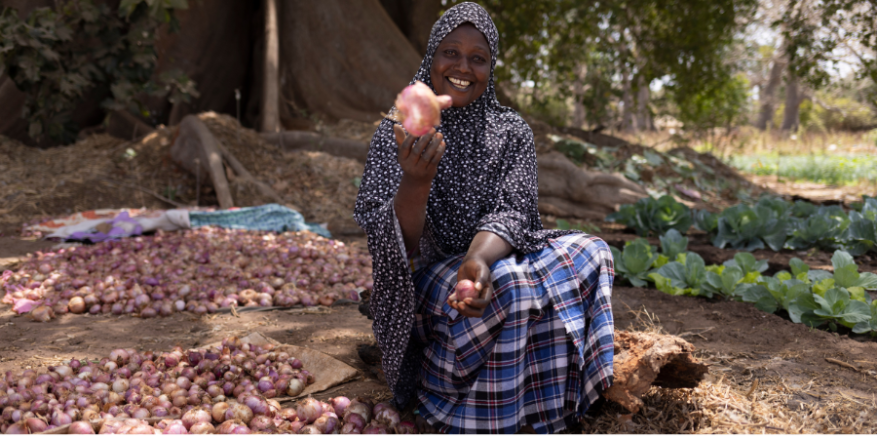Amie from Berefet village, The Gambia
Onions feature heavily on most Gambian households’ shopping lists, yet more than half of the onions consumed in the country are imported.
To help change that, and boost local economies and farmers’ incomes, we have been working with farmers, predominantly women, to increase both the production and business potential of this popular vegetable.
Through the EU-funded West Africa Competitiveness Programme, or ‘WACOMP’ for short, thousands of Gambian farmers have learned new growing and harvesting techniques that have enabled them to start growing onions year-round, which has significantly increased both production and income. Training in relevant business skills, including record keeping, financial management and negotiation has also boosted their confidence and bargaining power.
For smallholder farmer Fatou, who lives in The Gambia’s Central River Region, the arrival of the WACOMP project in her village sparked an interest in onion production that has transformed her income and unleashed her innovative side.
The 45-year-old has grown vegetables on her smallholder farm for years, but was forced to rely on poor quality seeds from her local market to feed her family of 20 and earn a living. But the seeds would often fail to germinate or perform badly – leaving her with less to sell at the local market.
Now, having accessed quality seeds and training, including accurate seed spacing, bed preparation, curing, compost making and application, as well as market-oriented production planning, she has felt empowered to trial new and innovative approaches to onion growing – with impressive results.
“Personally, my interest in onion production has increased and I now grow a lot of onions for the market,” the mother-of-eight said.
“After harvest, I pick all the small onions that cannot be sold and are left lying on the bed and keep them until the next production season, when I replant them on a well-prepared bed. After watering them for a while, the small onions sprout out beautiful branches and the bulb splits into many bulbs. I then separate all the small bulbs and transplant them. One bed would usually be transplanted to up to four beds of onions. These onion bulbs will grow as big as normal onions and it’s quicker than growing from the seeds. I have tried this innovation for two consecutive years, and it has worked.”
Fatou and other smallholder farmers pooled some of their income from selling bulbs to fund a community garden. Now, they are earning more and worrying less.
“I do not need to buy expensive seeds, the viability of which I am not sure, because I can replant the small onions I planted last season,” Fatou said. “I now worry less about germination failures or poor nurseries leading to poor harvest. And I can use the money I used to buy seeds with for my childrens’ education.”

